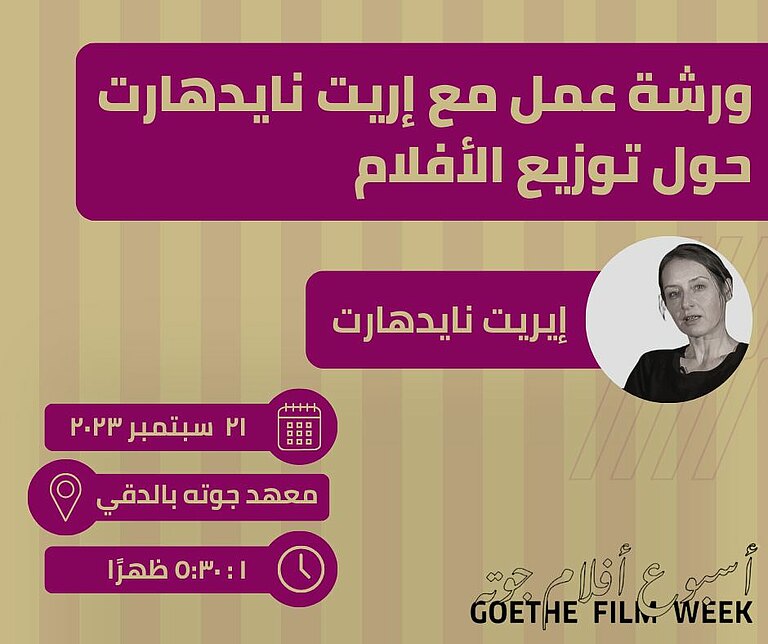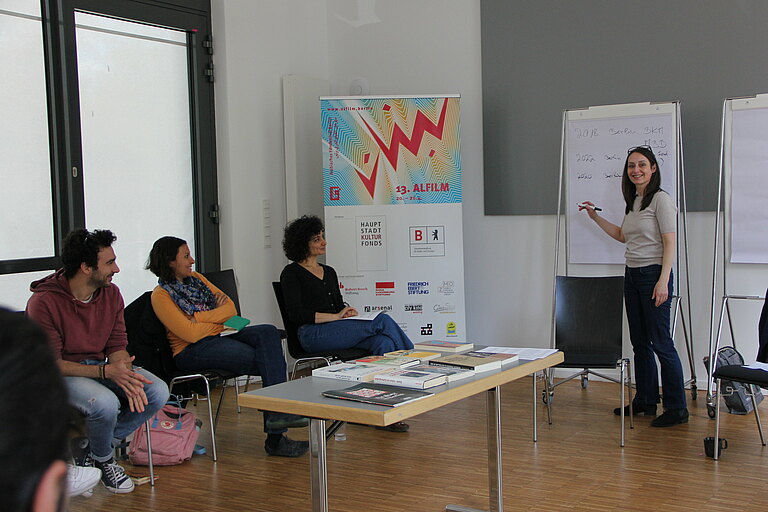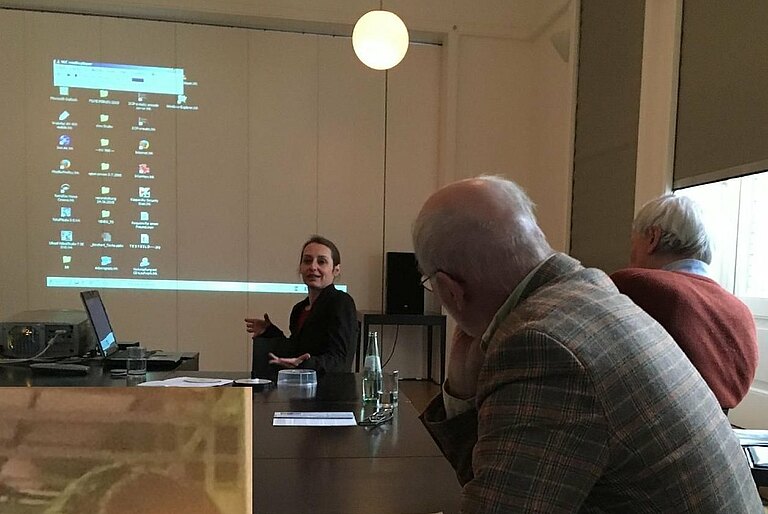Workshops and Tutorials
The imbalance of political power and the economic gap between Europe and the Arab World as well as the striking disequilibrium regarding the possession of and access to technological means of production directly affect the making of films. Thus how do the images we see from the Near East and North Africa come into being? Who produces them and to which interest?
In workshops I approach these questions from different angles. The starting point of a seminar can be the reception of films about or from Arab countries in Germany, the conditions of production of a state in the region, the mutual film history between Germany and an Arab country or another subject which is urgent to your institution.
Most of the workshops address a public in Germany, hence the examples on the German site are more comprehensive. My tutorials in Arab countries or for Arab directors and producers mainly deal with questions of funding and production as well as film sales and distribution.
In addition to the public events I also teach in training and formation programs such as the Film Prize of the Robert Bosch Stiftung for international cooperation between young filmmakers from Germany and the Arab World, Docmed, DOX:LAB or Documentary Campus MENA Region. The subjects are similar to the examples in the documentation below, yet the in-house curricula are not public.
Basics of International Film Distribution
Goethe Film Week - Cairo (Egypt) 2023
Thinking of making a film usually includes envisioning festival screenings, Q&As with the audience, streaming on VoD platforms, or other kinds of appreciation for the work the film-team has done. But how does the film reach its audience? Who is the audience? Where is it? What is the film market and who navigates a film through it? What are the legal aspects of distribution? When does the work of distribution start and whose job is it? What is distribution?
In this workshop, the participants are introduced to some basic rules of international film distribution. They will get an idea about how the film market functions in order to find a place for their own film in it. The aim of the workshop is to make the participants aware about what happens to their film once it is ready to be shown publically, and which aspects of the distribution should be taken care of already during production.
Does your film find the money or does the money find your film?
ALFILM Arab Film Festival Berlin - ATELIER, Berlin 2022
In his workshop we take a look at the relation between financing and the content and form of a film. In plenary sessions and group-work we will look at the financial biographies of your previous films and ask what kinds of films you intended to do and how much the results reflect your original ideas. What worked well with regard to the money the production could provide, what were pitfalls and what was the support that in retrospect had decisive value for making your film? How can you support each other?
Cinema as Crime? - Human Righs Films
Seminar at the Filmuniversity Potsdam / Germany 2021
"Human rights films are films that reflect current human rights abuses or show visions and aspirations to help those who suffer," Amnesty International writes on their website. Human rights films usually focus on communities that do not have their own access to the means of production; it is the directors who give people a voice. There is almost always a power imbalance between the narrators and their subjects, regardless of whether you produce in your own country or abroad. No matter how good the intentions of the filmmakers, it often happens that the people who should be supported use all the means at their disposal to resist the completed films.
Using one film example each from and about the Arab world, we will take a closer look at the concept and functioning of human rights films. Who are they made for? Whom do they serve and what do they conceal? How is it that human rights films continue to be attacked by those whose welfare they are intended to serve? The aim of the seminar is to become more aware of the complexity of human rights films.
Cinema as a crime? - Co-production in crisis and war
Seminar at the Filmuniversity Potsdam / Germany 2019
Regions of crisis or war offer a wealth of material for filmmakers. Especially when wars emerge from revolutions, as is currently the case in Syria, international co-productions increase. The films always take side, the directors are either rather openly part of one of the warring parties or they are embedded. This form of international cooperation - be it out of solidarity, a thirst for adventure or an interest in political education on the part of the partners in the safe countries - has existed since the Spanish Civil War in the 1930s. The filmmakers from the war zones are usually dependent on funding and post-production support from abroad. What do both sides know about each other? What are the foreign teams stepping into? What influence do the co-productions have in the war country and among its refugees? On the country’s politics? Who takes which ethical and legal responsibility?
These questions will be dealt with using the example of two Arab films. The aim of the seminar is to get a better idea about what it means to work in unknown contexts and to become more aware of one's own position / role in co-productions with colleagues from regions of crisis and war.
War and Media: Images of Syria
state-recognized further training for teachers, Nuremberg International Human Rights Film Festival / Germany 2016 and Inhouse Formation Motivés e.V. Gießen / Germany 2019
Till 2011 Syria was a relatively closed country. Not many images have reached us, be it in the media, in the field of art or in cinema. Since the beginning of the political uprisings and the subsequent civil war five years ago, images of Syria are suddenly very present in the media on a daily basis. Thus how can we understand them? On the basis of short TV-reports from Arab and German broadcasters as well as internet videos the most common image- and language strategies of the war parties are illuminated and analyzed in the context of theoretical concepts of war in the media. Continue for Nuernberg in German
Each Short Film in Its Own Right
Qumra Shorts Group Tutorials, Doha Film Institute 2017
mec film is a Berlin-based company that exclusively distributes films by Arab directors. A fair number of the titles in the company’s international catalogue are short films. Using the examples of Larissa Sansour and Soren Lind’s ‘In the Future They Ate from the Finest Porcelain’, Bassem Breche’s ‘Free Range’, Sherif Elbendary’s ‘Dry Hot Summers’ and Annemarie Jacir’s ‘Like Twenty Impossibles’, Irit Neidhardt discusses the challenges and potential of short film distribution.
program booklet (PDF) | photos
Palestinian Cinema: Autonomous? Independent?
in the framework of the cultural month Filistina, Municipal Cinema Hannover / Germany 2016
The Palestinian Liberation Organization PLO, which operated from exile, used films as one tool in the struggle for independence. With their help a counter public as well as the control over the own images was to be created. Though some of the film-makers had individual cinematic handwritings, the development of a Palestinian cinematic language had no priority. The cooperation with film-makers from German Democratic Republic and the Federal Republic of Germany played a special role for the PLO. In the seminar this cooperation will be looked at on the basis of case studies and film excerpts and analyzed with regard to its historical and political meaning. After the seminar the film "Omar" will be shown at the municipal cinema at 8.15pm. It is an example of Palestinian film-making oppositional to the PLO. The film will be introduced by Irit Neidhardt. More in German
Film Funding and Distribution
At the Arte Film Week, French-German Cultural Center Ramallah / Palestine 2012
program leaflet (PDF)
Images for a conflict with no end
At the Arsenal Summer School: Cut! Interventions of the Documentary, Arsenal Berlin / Germany 2011
The third Arsenal Summer School will be taking place from August 25-27 entitled "Cut! Documentary Interventions". A series of eight events, including discussions, Q&As and film screenings, and a range of different speakers from practical and theoretical backgrounds will explore the relationship between both the documentary and the political and form and content and examine the conditions for documentary production. Contributors: Karin Jurschick, Brigitta Kuster, Claus Löser, Avi Mograbi, Irit Neidhardt, Philip Scheffner, Stefan Stefanescu, Florian Wüst. Chaired by: Milena Gregor, Birgit Kohler, Stefanie Schulte Strathaus. Continue



